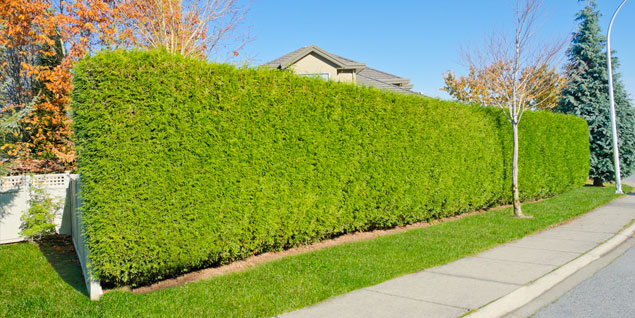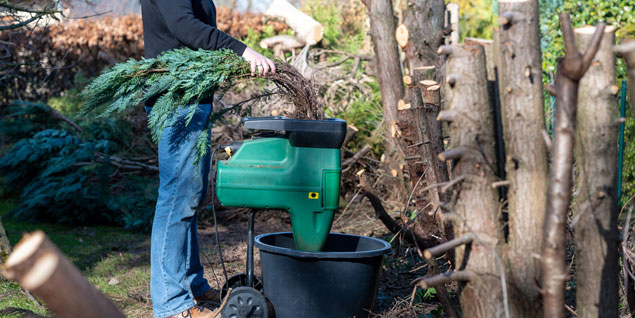Garden Hedge Removal Costs, Calculator & Free Quotes
Last Updated on By Jon
If you've got a hedgerow you would like removed and don't know where to start, read our cost guide for further information, average prices and free quotes from local landscape gardeners.

Average hedge removal costs
Want some average prices for removing your hedgerow? Take a look below:
| Job | Average Cost | |
|---|---|---|
| Small Hedge Removal (2 - 4m) | £178.50 | |
| Large Hedge Removal | £336.00 | |
| Large Leylandii Hedge Removal | £336.00 | |
| Small Privet Hedge Removal | £178.50 | |
| Large Privet Hedge Removal | £336.00 | |
| Excavator Hire | £84.00 | |
| Labour Per Day | £131.25 | |
(Prices taken from multiple sources and averaged) Prices Checked 08/07/2025 |
||
Hedge Removal Cost Calculator
Traditionally the height and length of a hedge will determine the cost of trimming and removing a hedge. For example, you can pay approximately £178.50 for removing a small hedge like 2-4 meters long.
Leylandii hedge removal cost
Leylandii hedge is also known as conifer hedge; this hedge is usually used by individuals seeking privacy. It’s capable of growing one meter per year.
The faster the growth of this hedge, the higher the cost of cutting it. The average cost of removing the giant Conifer hedge is £336.00; however, this cost increases if you use specialist equipment.
Removal cost of privet hedge
You have to measure both the width and height of your privet hedge to estimate the accurate cost of trimming it. Furthermore, you can also visit an online consultation and seek the services of a professional tradesperson to help you estimate the cost. For example, it will cost you £178.50 for trimming a relatively small hedge, while you can spend around £336.00 removing the larger hedges.
Additional costs to consider
If you have organic matters that need to be removed, it’ll increase the cost of trimming the hedge. While removing your hedge, the cost may also increase if you require a mechanical excavator and a chipper onsite during the process. Lastly, the cost of trimming your hedge may increase if the tradesperson will require specialist equipment to access your tall or awkward hedge.
Factors affecting the cost of hedge removal
Various factors affect the cost of removing a hedge; these factors may include:
- Established trees and woody shrubs are likely to increase the cost, as they’ll need machinery like stump grinders and mini-diggers to remove them.
- Is a skip needed to cart away and dispose off the hedge, or will a wood chipper be required to chip off some materials?
- The age and maturity of the hedge will affect the cost of removal; you’ll determine this by the establishment, extensiveness, and root depth of this hedge.
- The future use of the area will also determine the cost. For example, do you require to remove the hedges, including the roots, altogether and leave the space better for future remedial works, or are there no remedial works on the space?
- The hedge’s height. The cost of trimming tall hedges may increase as the tradesperson may use a ladder or other equipment to reach the hedge.
- The cost may increase when the hedge is adjacent to the road and will need the roads to be closed while removing them.
- The hedge’s length. It will cost more to remove longer hedges as it takes more time to trim and remove them.
- The accessibility of vehicles and machines to the removal site will also determine the cost of removing a hedge.
Reasons for removing hedges
Householders are triggered to remove the hedges because of a lot of factors, and these factors include:
- A householder prefers fencing as a boundary rather than hedges.
- It can be removed to save the time you use to maintain the hedge.
- The hedges become aesthetically unattractive after overgrowing.
- You can remove the hedges when the hedge brings problems by encroaching the garden's small available space.
- The hedges make it hard for either your property or garden to receive light.
- When they need to re-design the garden and the hedge is on the way, or maybe the perimeter doesn't need to have a hedge in its plan.
Advantages of replacing a hedge with a fence
Many advantages come with replacing a hedge with a fence; the advantages include:
- Fences don't have roots and branches, affecting driveways, cabling, drainages or blocking lights, and even encroaching onto neighboring gardens.
- Fences are preferable in limited spaces like the gardens as they don't encroach as much as the hedges; thus, you’ll create more space if you replace them.
- It’s less costly to maintain a fence than the hedge, which needs regular trimming and watering.
- You can fit a trellis and grow some climbing plants on the fences if you want a greenery look and encourage insects and birds; all this comes without any cost of maintenance and upkeep like the case for the hedges.
- Fences provide a total barrier and boundary which the hedges can’t provide, as they have spaces through which children and other home pets can cross through to other people’s gardens and even roads.
Replacing a hedge with a hedge
Some people tend to replace their hedge with a more suitable one because hedges don't have many pros over the other types of perimeter barriers. In addition, an individual may choose to replace the hedge with a more aesthetically and attractive to wildlife one. For example, because of the heights the Leylandii trees can grow, they cause problems in the household and between neighbors, you opt to remove them. These hedges affect other plants in the garden by blocking light, draining the land and nutrients in the plants' soil. In addition, the hedges may grow to a height that makes trimming them more complex, thus rapidly growing out, causing problems to neighbor properties and adjacent roads.
You can replace the unwanted hedge with a completely different one. This replacement will bring improvement to the property without losing the greenery feature completely. The ability of hedges to block dust and noise from the roads and neighboring properties make most individuals prefer them over the fences. The hedges achieve this because of the effect of the foliage and the branches. Furthermore, hedges are attractive to wildlife, making them the most suitable eco-friendly choice.

How to remove a hedge
You need to check and make sure the hedge is not interfering with any cabling or drain runs. The interference with cablings or drain runs will majorly affect the process when you remove the whole hedge, including the stumps, using a mini digger.
Then cut or lop the hedges to reduce their size; this exposes the main plant's structure that comprises the hedge node. You then cut the trunks and chunks to ground level before embarking on removing stumps and root balls. A homeowner can work alone to remove a small hedge while you will need the assistance of professional machinery and equipment to work on a larger hedge.
Getting rid of a large hedge
To cut down the whole hedge, you need to hire a gardening or landscape contractor to cut down these hedges and leave row stumps. The row stumps depending on the cost, preferences, and other factors will need to ground out and remove manually.
Do you need planning permission to remove a hedge?
Depending on the location of the hedge, you may need permission to remove the hedge. You may require planning permission if your hedge is bordering agricultural or common lands like villages or town greens. You also need permission if the hedge borders site for particular scientific interest or any local nature reserve. If the hedge borders a domestic garden or it’s less than twenty meters, you may not need this permission to remove it. The twenty meters should include any breaks or gaps in the hedge like a gate. You’ll be given a hedgerow retention notice if you applied for the planning permission and the authorities didn't approve. It’s a criminal offense that attracts a maximum fine of £5000 if you remove the hedge without permission in areas where you ought to seek permission.
When is the best time of the year to get rid of a hedge?
The best time to get rid of the hedge is during the early spring or late autumn but not during the long hot days of the summer. During early spring, it’s the time before the nesting season, and in late autumn, all the chicks have grown and fledged, leaving most nests empty. But during the summer is when the bird's nest, so it’s better not to work on these days. July after the harvest is the time most farmers prefer to start the hedge work. It’s good to keep checking the birds' nests, as some bird species go into August while continuing to raise their young ones. The protection of the birds determines the time you can remove the hedge. Thus you shouldn't remove the hedge if there are active nests. Remember, no laws are guiding the time to remove your hedge.
Does getting rid of a hedge affect birds and insects?
Despite the type of hedge, hedges provide a home for various wild animals, including birds. So yes, removing hedges will affect the birds most. To avoid this, remove your hedge after the nesting season. Also, remember the hedgehogs may seek hibernation cover at the base of these hedges. Finally, to compensate for the wildlife's habitat loss, you can provide flora and foliage in the gardens.

What is the 1996 Party Wall Act?
For the protection against any damages or disruption of property from the works on the neighboring property, the government came up with this statute. Shared walls, external boundaries like fences, walls or hedges, and houses should abide by this legislation. Under the provision of the Act, you need to agree with the neighbors to keep their properties safe and silent in their compounds as you remove your hedges. Whether the hedge is solely owned or jointly owned, the 1996 Party Wall Act should apply.
Who owns my boundary hedge?
It’s a shared responsibility when we have a hedge shared between two properties; everyone is responsible for maintaining their sides. The shared responsibility will see either householder working on their side, that is, by trimming and maintaining the hedge on their side. When one of the households claims the ownership of the hedge and wants to remove it without consulting the other, it brings issues. If both parties share the maintenance, the property's title deed will help identify the owner of this hedge.
Can a hedge be in joint ownership?
Two or more households or landowners can have the ownership of the same hedge. When there are differences in preferences, like one owner wanted it removed while the other wants the hedge to remain, it makes the removal a complicated issue. One party can claim the full ownership of the hedge if it’s planted on one side of the boundary; the hedge owner can make any decision they want. To remove a party hedge, i.e., the hedge on the legal boundary, not on one side, you also need to seek consent from the neighbor. You can go ahead with the removal of the hedge if they give consent for the removal. If you remove and replace the hedge without their consent, you may take care of all the costs.
Compare Garden Specialists Now